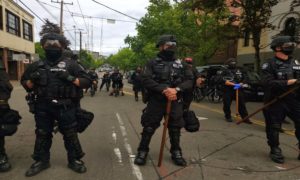For many Seattle Central students, mental health is an overlooked priority to success. Students are not taught coping skills prior to college, how to navigate the healthcare system for services, or to ask for help. Burnout is on the rise with millenials, and steadily been climbing for Gen-xers. The issue lies generally in some students being unable to find the help needed in a centralized place. Seattle Central offers some short term therapy services, but some students face the reality of needing more long-term care after accessing SCC services.
Bryson Walb, a counselor at Seattle Central College, served 15 years with the TRIO program before working in the counseling center, which has been in commission since Fall 2018. “Previously the counselors were all tied to their respective departmental areas,” and although this had its advantages, “there was no front desk person… accessing counselors was much tougher back then.” Bryson now represents students from a handful of departments, and now has the luxury (along with his clients) of having slotted one-hour sessions throughout the five-day week.
Harlow Poffenberger, a first year visual media student at SCC, utilized the counseling service at the end of Fall quarter 2019.
“I just wanted to decompress,” says Poffenberger, after having ensured an “arduous” quarter in a program known for its rigorous course load. “Ultimately I felt better because it’s nice to have that outlet to talk about your problems.” Poffenberger remarked on the seamlessness of the process – a simple walk-in, and the arrangement of an appointment with reception to see the designated counselor. However, the program as a whole, Poffenberger would add, has its limitations.
Because her counselor is well connected within the school community, Poffenberger had some reservations as to how much information she was willing to divulge. “Because I wanted to talk about things within my department, he still knows staff members, so I didn’t feel comfortable completely opening up about things as I would a separate counselor.”
Poffenberger also expressed some disappointment in the overall outcome of the appointment, whereby, although she “felt better” after the talk, she left feeling a bit directionless as the session’s primary purpose was to refer her to another psychotherapist – a daunting feat given that she is currently without adequate healthcare. “I felt as if his soul purpose was just to say, ‘it would be good for you to see another counselor’ because I’m not supposed to see him on the regular.”
Poffenberger was disappointed to find that were no discounted services or long-term counseling services specific to ongoing needs; that although these resources are better than nothing, she felt they were “ a far cry from what students actually need if they’re in a relatable situation.” I really liked [my counselor]. I wish I could see him on a regular basis, that it was provided by the State of Washington.”
“We don’t market ourselves as long-term therapy,” added Bryson, noting the underlying objectives of the center specific to accommodating student needs. “We do a lot of checking in with people, crisis issues, phase of life, working toward short-term goals, but ultimately referring out if there’s more intensive stuff going on.” Bryson mentioned Apple Health as being a point of emphasis when suggesting alternate aid for his clients; however, it isn’t clear just how effective the providers are under this umbrella when it comes to long-term mental healthcare. “This is the problem when we’re talking about state resources in terms of what kind of financial support there is for that care; it’s limited, so it’s their job to assess if this is a crisis.”
“If your tooth hurts you want relief, and mental health is no different. You want the best remedy possible. “But we’re in the context we’re in,” said Bryson. “We don’t have any magic answers. We provide some support and gap work and getting people connected to other service and hopefully provide some short term relief while meanwhile getting people connected to better resources outside.”
Bryson mentioned the myriad services that aim to serve various populations, including The Student Parent Support Program, Veterans Services, Re-Entry Support Programs and Food and Stability Resources – forms of assistance that serve a means to an end within the educational boundaries, but also indicative of the state’s inadequacies in accessible, long-term solutions.
Bryson acknowledged the limitations of state care and emphasized the importance of equipping students with the tools to manage amid stressful times.
“There is a new study showing rises of anxiety and depression in student populations in these particular phases of life,” added Bryson. “The need for services is outpacing the supply.”






Comments are closed.